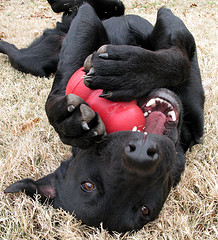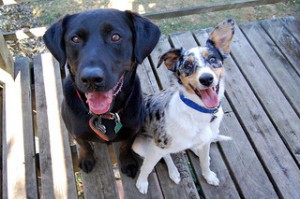Have you ever noticed, upon achieving a goal, the rewarding sense of accomplishment that is completely separate from the goal itself? Completing a task or achieving a goal seems to be rewarding in itself, independent of the actual outcome of that task or goal. Do other animals feel this sense of accomplishment after achieving a goal? A recent study suggests that dogs might.
In their study, McGowan et al. (2013) investigated how dogs reacted to rewards after solving a puzzle compared to receiving a reward randomly. First, they trained dogs to solve various puzzles, such as pressing a lever or pushing a box over, in order to get a reward.
 During the testing phase, a dog would be led into a room containing a puzzle. In the experimental condition, the puzzle was one that the dog had been trained to solve. Once the dog solved the puzzle, a door would open, allowing the dog to access the reward. In the control condition, the puzzle was completely new to the dog, who had no idea how to solve it. The door to the reward would open randomly, regardless of what the dog did. The important difference between these two conditions is that in the first (experimental), the dog had control over access to the reward, whereas in the second (control), she did not.
During the testing phase, a dog would be led into a room containing a puzzle. In the experimental condition, the puzzle was one that the dog had been trained to solve. Once the dog solved the puzzle, a door would open, allowing the dog to access the reward. In the control condition, the puzzle was completely new to the dog, who had no idea how to solve it. The door to the reward would open randomly, regardless of what the dog did. The important difference between these two conditions is that in the first (experimental), the dog had control over access to the reward, whereas in the second (control), she did not.
The dogs were tested on six trials per day for six days (three days in the experimental condition, three in the control condition). Having all the dogs participate in both conditions allowed the experimenters to control for individual differences in the dogs’ temperaments.
McGowan et al. closely examined and compared the behavior of the dogs in the two conditions and made some interesting findings. First, they found that dogs in the experimental condition wagged their tails more frequently than dogs in the control condition. Conversely, dogs in the control condition chewed on the puzzle devices, but dogs in the experimental condition did not.
 We can easily interpret the tail-wagging results: clearly, the dogs were in a more positive emotional state while in the experimental condition than while in the control condition. The chewing behavior is a bit more difficult to interpret, but McGowan et al. suggest that it was the result of the dogs’ frustration with their inability to open the door by solving the puzzle.
We can easily interpret the tail-wagging results: clearly, the dogs were in a more positive emotional state while in the experimental condition than while in the control condition. The chewing behavior is a bit more difficult to interpret, but McGowan et al. suggest that it was the result of the dogs’ frustration with their inability to open the door by solving the puzzle.
Both of these behaviors were measured before the door to the reward was opened, so they can’t be attributed to receiving the reward. Rather, they suggest that the differing emotional states of the dogs in the two conditions were due to the dog solving the puzzle (or not).
(Note: Animal emotions are a source of conflict among researchers. Some insist that nonhuman animals do not have emotions, others say that they have emotions but they aren’t the same as human emotions, still others assert that nonhuman animals have the same emotions as humans, and many more researchers fall somewhere in between. For the purposes of this blog post, I’ll stick with the very vague term “positive emotion” to describe the canine equivalent of “sense of accomplishment”.)
A particularly interesting result is that in the experimental condition, the dogs were excited to go to the testing room at the start of each trial. However, in the control condition, while they showed excitement on the first couple trials, the dogs became reluctant to go to the testing room in later trials. McGowan et al. think this could be due to apathy caused by the dogs having no control over their environment (i.e. opening the door to the reward).
Overall, these results indicate that dogs, like humans, experience a positive emotion after achieving a goal that is separate from the direct result of achieving that goal (in this case, the reward). Furthermore, the behavior of the dogs in the control condition suggests that a sense of having control over the environment may play a part in this positive emotion. Which makes sense, when you think about it. If we assume that feeling like you have control over your environment is an important component of happiness or wellbeing, then achieving a goal or completing a task (i.e. changing your environment in a self-defined way) should cause a positive emotion.
McGowan et al. also used three different rewards (food, human contact, and canine contact) and compared the dogs’ responses – check out their paper for the interesting results!
Source Cited:
McGowan, Ragen TS, et al. “Positive affect and learning: exploring the “Eureka Effect” in dogs.” Animal cognition (2013): 1-11.

